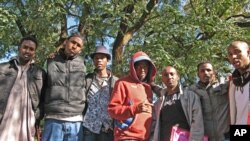Refugees and asylum seekers from Somalia and other troubled African countries seeking a new life in South Africa are bracing themselves for tighter regulations as part of planned government amendments.
Several dozen Somali men and women mill around the offices of human rights lawyers in Pretoria, showing the papers they have brought with them to bolster each of their cases.
Sadik Muhammad is frustrated with delays in trying to get to the last step for himself: South African citizenship.
"If I have stayed in South Africa about seven years, according to the law of South Africa, I am supposed to have the exact thing of becoming a citizen, a real citizen, so I am supposed to have had that actually when I finished five years," Muhammad said.
Abdoul Kadir came more recently by land from southern Somalia, going through Kenya, Tanzania and Mozambique. He says amendments currently being considered by South Africa's government and parliament seem to criminalize those seeking asylum, even though they are victims everywhere they go, including South Africa.
"The reason I came here to this country is to get a peaceful life so that I can continue. And I left back home there because of problems and still the problems exist in this country. So I do not see there is any difference. We as entrepreneurs, we as Somalians, we go to the locations and informal settlements and we make our small businesses there. When we open there, we have been attacked, killed and nobody is doing anything about it," Kadir said.
The United Nations refugee agency, UNHCR, has estimated more than 7,000 refugees from Somalia live in South Africa. From 2002 to 2010, human rights lawyers say South African gangs killed more than 700 Somalis in the country, to intimidate their community, rob them or destroy their businesses.
Pretoria-based human rights activist Gabriel Shumba has been closely following the proposed amendments to South Africa's Refugee and Immigration Acts. The 1998 Refugee Act has been in force since 2000.
Shumba is worried about a proposed change which he says would require asylum seekers to process their application within five days of entering the country, rather than the current 14.
"We think that places a very onerous and unconscionable demand on somebody who is fleeing his or her country and that person first needs to deal with bread and butter issues to see where she will sleep, shelter issues, linking up with possible people who give support," Shumba said.
If the amendments are approved, failure to report within five days would result in immediate deportation or two years imprisonment.
South African Deputy Home Affairs Minister Fatima Chohan said earlier this month that the proposed amendments would make it more difficult for those trying to abuse the asylum seeking process.
She also said the government was trying to improve the process, including setting up new committees to decide on the status of applications.
Shumba would like to see fewer administrative demands on those who have already started the asylum process, and are asked to repeatedly go back to processing centers.
"The reason you find that people are always congesting the centers is partly because they have asked them to come and renew their permits maybe three months after every visit, or six months after every visit, but I do not see why you should not give asylum applicants two years if you see that it will take you two years to adjudicate on his or her status in the end," Shumba said.
The latest UNHCR estimates indicate there are currently more than 50,000 refugees in South Africa and over 400,000 asylum seekers, with more and more coming from countries such as Malawi, Ethiopia and Zimbabwe. Human rights activists say the numbers from Zimbabwe are underestimated, and that there are more than 350,000 asylum seekers from that country alone.
Refugees, Asylum Seekers in South Africa Brace For New Regulations




